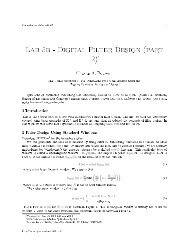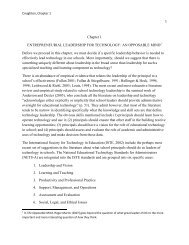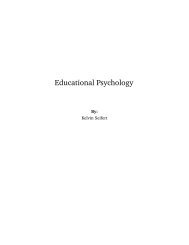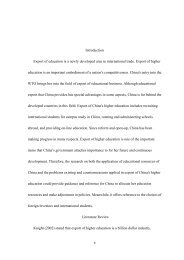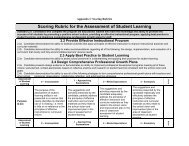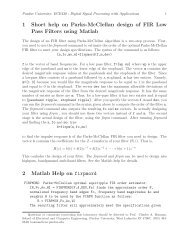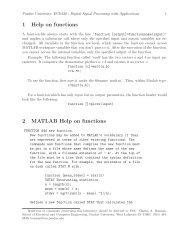Blazing New Trails - Connexions
Blazing New Trails - Connexions
Blazing New Trails - Connexions
Create successful ePaper yourself
Turn your PDF publications into a flip-book with our unique Google optimized e-Paper software.
Shadows and Images II 11<br />
settings, implement ideas, monitor and evaluate them, all with the assistance of classmates<br />
and the professor? By removing an administrator to the sterile environment of the university<br />
classroom, we ignore a rich, available resource for providing first-hand experience that can<br />
help develop competence.<br />
Finally, what would it hurt if every professor adopted a school each year and served as<br />
a mentor, an observer, and a helpful critic? Not as a consultant, I hasten to add, but as a<br />
portion of his/her regular set of assignments. Hard work? You bet. Important work? Without<br />
question. But, this sort of involvement with the real life of schools, students, and<br />
administrators is what we as professors should be about.<br />
Shadow/Image Number Three<br />
The popular notion that competition for students between and among schools, the socalled<br />
market-based approach, is the solution to education’s problems, to my way of thinking,<br />
to be charitable, is short sighted and untenable. First, applying the free enterprise model of<br />
business is naïve. Education is not a business. We are not working with widgets of identical<br />
characteristics. We don’t have a singular, specified outcome for our “products.” Our<br />
customers don’t want the same identity for all of our “products.” I could go on, but I suspect I<br />
am preaching to the choir.<br />
Second, our measures of “success” and “quality” are rudimentary at best. Judging the<br />
effectiveness of educational output with a few tests of cognitive prowess is simplistic.<br />
Successful, educated human beings are more than an answering machine on foot. Remember,<br />
everything that can be counted doesn’t necessarily count, and everything that counts can’t<br />
necessarily be counted.<br />
Third, I believe that we as a society have confused education and schooling. Our<br />
critics focus on schooling but hold us accountable for education. That is an impossible task!<br />
To be sure, we as school people have a critical role in the education of students. But, think of<br />
the other educational forces at work in our society. Family, church, community, sports, and<br />
media are all important actors in the education process. Think of your own background. How<br />
much of your educational attainment is attributable to schooling alone?<br />
So, when competition among schools is introduced as the “answer” to education’s<br />
problems, I become somewhat paranoid. I smell a sinister effort to dismantle the current<br />
public education system in order to institute a non-system that caters to special interests of<br />
specific ideologies in the ever growing fractiousness of our society. I fear that the public<br />
schools will become the pauper schools with charter and private schools educating the<br />
children of those families able to afford alternatives, thus furthering fractioning our society.<br />
Competition among schools for students has resulted in a plethora of charter schools<br />
that have sprung up all over the nation. The media, public school critics, and the political<br />
establishment appear to have all boarded the bandwagon of charters as the cure-all solution<br />
for American education’s problems. But, what are the results?<br />
The results are mixed at best, and often conflicting. Admittedly, I have not read all of<br />
the charter school studies and reports. However, it appears to me that most of the studies<br />
focus on one or a small number of schools. Supporters often cite the records of the successful,<br />
individual schools as evidence of the movement’s success. Using these reports as examples of<br />
the success of charter schools, in general, is poor scholarship at best, or political manipulation<br />
at worst. There have been a few national studies of charter school results. Let me cite two<br />
such studies. One was a national study conducted early in the life of the movement and<br />
addressed inputs extant in the schools. In 2003, Policy Analysis for California Education



